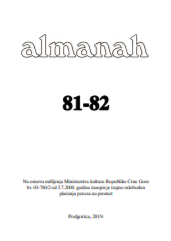Saradnja muslimanskog i pravoslavnog stanovništva u toku austrougarske okupacije Bosne i Hercegovine 1878-1882. godine
Cooperation of the Muslim and Orthodox Population During the Austro-Hungarian Occupation of Bosnia and Herzegovina 1878-1882
Author(s): Nada TomovićSubject(s): Christian Theology and Religion, Military history, Social history, Islam studies, 19th Century, Between Berlin Congress and WW I, Eastern Orthodoxy, Inter-Ethnic Relations
Published by: Almanah
Keywords: Bosnia and Herzegovina; Austro-Hungary; Montenegro; rebels; Orthodox; Muslims;
Summary/Abstract: This paper investigates the cooperation of the Mulim and Orthodox population during the Austro-Hungarian occupation of Bosnia and Herzegovina in the period from 1878 to 1879. By decision of the Berlin Congress (1878), Austro-Hungarian Empire obtained the right to occupy Bosnia and Herzegovina. Despite the fact that Montenegro gained the independence and significant territorial expansion, it was difficult to accept loosing the ares that it had liberated together with the Herzegovinian rebels. On the other hand, the Muslim population, both in Bosnia and Herzegovina, did not accept the new governence. This motivated cooperation of the former enemies against the Austro-Hungarian authorities. However, Montenegro was in a very specific situation. The Vienna government gave the ultimatum to Cetinje to renounce its pretensions in Herzegovina. Therefore, Prince Nikola had to enforce the resereved policy, in oder to avoid political and economic implications that could result from the conflict with the powerful neighbour. Nevertheless, the Herzegovinian rebels and prominent Muslims were expecting a help from Cetinje. Montenegro secretly helped the rebels even after the uprising was suppressed in 1878, and also provided help for the uprising in 1882. Both the Orthodox and Muslim population have found refuge in Montenegro.
- Issue Year: 2019
- Issue No: 81-82
- Page Range: 65-74
- Page Count: 10
- Language: Bosnian
- Content File-PDF

